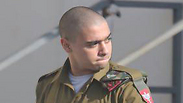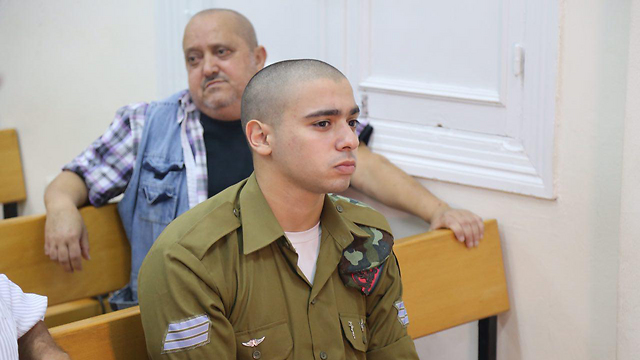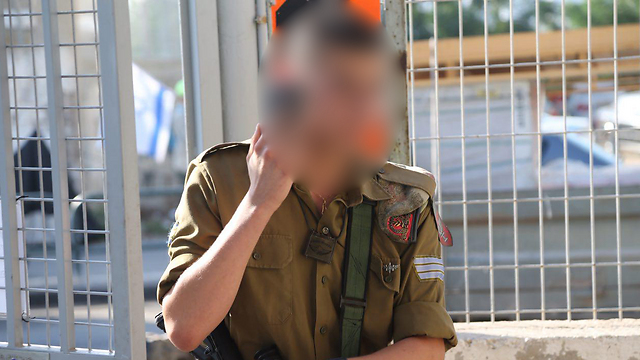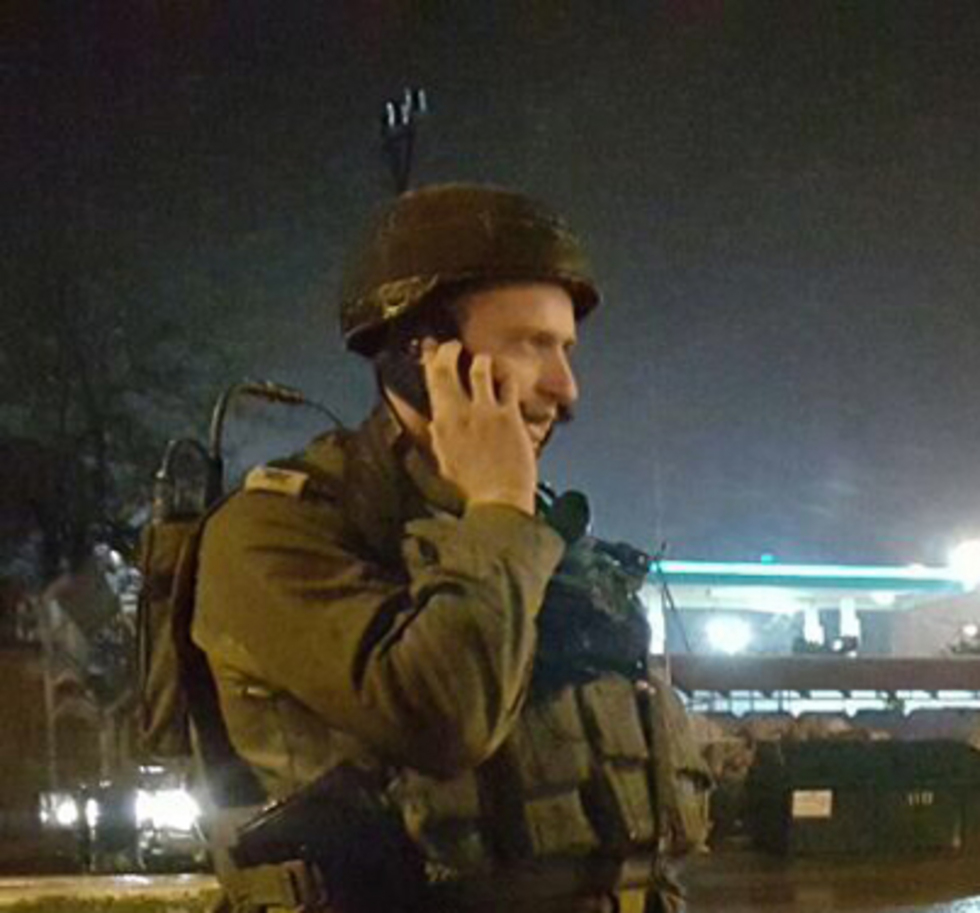
Soldier at scene of Hebron shooting: 'Elor acted based on instinct'
After telling investigators that 'if I had known what Elor was about to do, I would have stopped him,' Sgt. M. says in court 'the interrogator yelled at me and was angry at me. I don't know if it was because I gave him answers that would help Elor.'
Two soldiers of the Kfir Brigade's Shimshon Battalion, who were with Sgt. Elor Azaria when he shot dead an already-neutralized terrorist, testified in court on Monday, with one of them, Sgt. M., saying "at first we thought was Elor did was grave, and only later did I realize there could have been a bomb on the terrorist. I realized Elor acted correctly, based on instinct."
Sgt. M., who is seen in a B'Tselem video of the incident receiving Azaria's helmet from him and is one of the few to have seen the shooting up close, also confirmed the testimony he gave to the IDF's Criminal Investigation Division (CID) according to which Azaria told him that because the terrorist stabbed his friend, he deserved to die.
In four different opportunities during his questioning by the CID, Sgt. M. testified that "if I had known what Elor was about to do, I would have stopped him," adding "He didn't seem to regret the shooting but he appeared to be stressed."
His testimony at the trial, however, was different. "I was in shock. I didn't really realize what was going on there. I didn't think Elor was going to shoot (the terrorist)," he said.
Sgt. M. had a hard time talking and asked to write what he wanted to say: "The state didn't back Elor. He's not a hothead. He's a good man who helps a lot."
Explaining the change in his testimony, Sgt. M. said that during his questioning at the CID, "the interrogator yelled at me and was angry at me. I don't know if it was because I gave him answers that would help Elor. There was a tensed atmosphere at the CID, the interrogator wouldn't let me go outside."
Speaking of his service in Hebron, Sgt. M. said, "even though we were not briefed about explosives, Elor and I were afraid of them (in general —YZ)."
"We were not drilled on terror stabbings or briefed on it, or on isolating the scene of an attack, or on how to deal with an explosive belt on a terrorist," Sgt. M. explained.
"The terrorist's coat was very inflated between his abdomen and chest area," Sgt. M. recounted. "A terrorist with such a warm coat was what raised suspicion. We kept our distance from the terrorist because he was not cleared by the bomb squad. I was scared and so were others."
Judge Col. Maya Heller pressed Sgt. M., "Who exactly were the ones scared? Earlier you said you weren't scared. Why the change?"
Sgt. M. responded, "I was scared and so was Elor. I wasn't scared during the incident itself, but after the incident I realized where the concerns had come from. Fear can manifest in several ways. One of the things I felt during the incident itself was stress. This could also be perceived as fear. The terrorist could not have gotten up and physically hurt us, but he could've set off a bomb."
He also claimed his testimony at the CID was influenced by the B'Tselem video showed to him during questioning, attributing it to the title of the video: "Soldier executes Palestinian lying down."
Judge Col. Heller pressed further, "But an hour and 20 minutes before that, even before you saw the video, you said you spoke to the defendant and told him the shooting was not proper and 'You shouldn't have done it.' Regardless of the video or its title, in the field, soon after the shooting, you told Elor the shooting was improper. Why was Elor's shooting improper, as you told him?"
Sgt. M. responded, "It appeared to me at the time, in the field, in that moment, that the shooting was improper. But I've now realized that I'm justifying his actions."
'I didn't feel like terrorist posed a danger to me'
Later, Sgt. A., a squad commander who was also on the scene, took the stand. His was a different version to Sgt. M.'s version.
"The terrorist was grunting or maybe convulsing. I didn't feel like he posed a danger to me. He may have been dangerous for other reasons. When there's suspicion of an explosive belt, we were instructed to keep our distance and apply the rules of engagement. I didn't feel in danger from this terrorist," he repeated.
However, he added that "the terrorists, as far as I knew, were not yet cleared (by the bomb squad) and that's why no one approached them. It's strange the bomb squad did not come to check the terrorists."
Sgt. A. accused the Kfir Brigade commander (Col. Guy Hazut) of "telling us something very inciting in the briefing: That the settlers were yelling (about the terrorists having explosives —YZ) without a reason, just so we don't treat the terrorists."
He read his testimony to the CID: "Elor told me after the shooting, 'My friend was stabbed, they wanted to kill him.' He said it as if in apology, emotionally."
"The atmosphere at the scene of the attack was to wait for the bomb squad... the police shouted there was a bomb disposal expert on the way. I didn't look at the terrorists so I would not be horrified by the sights," he added.
Sgt. A. went on to say that "in the days following the incident, the company commander, the battalion commander, the brigade commander and the IDF Spokesman's Office's representative spoke to us about the incident on several occasions and told us it was grave. This has an effect on me, when the commanders talk about the incident. Even the IDF chief of staff said this incident was wrong. I think the military needs to first and foremost back the soldiers, and come out against them only after an investigation."
Sgt. A. said Azaria was "sensitive, gentle and not quick-tempered. He was very quiet and family oriented. Not a guy who causes trouble. He wasn't a Beitar Jerusalem fan, or part of the La Familia fan group."
Elor's sister, however, previously described her brother as "a diehard Beitar fan" and photos on his Facebook page confirm this.
The fans of the Jerusalem-based soccer club have a long history of racist comments and violent outbursts, particularly against Arabs. A specific fan group of the soccer club, La Familia, is particularly notorious of its hate speech.
Battalion commander's testimony: 'Elor was panicked'
Azaria's battalion commander, Lt.-Col. David Shapira, is expected to testify on Tuesday. He is the most senior commander to testify who also spoke to Azaria following the incident.
"About an hour and a half to two hours after the shoot, I spoke to Elor for the first time, after consulting with the brigade commander and agreeing the soldier would come to me for a debrief," Shapira told ICD investigators in a lengthy testimony spreading over nine pages.
"We spoke next to the guard post at the Jilbar checkpoint, where the incident happened," Shapira continued. "I asked him why he shot (the terrorist) and he answered that he felt in danger because he saw the terrorist with a knife close to him. I asked him, 'So why didn't you go and kick the knife away? Why did you have to open fire?' And he said 'I felt in danger.' I told him I thought he was not telling the truth and that I did not consider the shooting justified, as the company commander was standing nearby and did not feel in danger. Because of the severity of the incident, I informed him he was suspended from fighting and that he will be taken for questioning with the brigade commander."
ICD investigator: "How did Elor react to this?"
Shapira: "To the best of my memory, he was pretty quiet, didn't say anything. He seemed a bit panicked."
Shapira stressed to investigators at this point that "the things Elor told me definitely contradict what he said after the shooting to the company commander, Maj. Tom Na'aman. (Azaria) told (Na'aman) he didn't feel in danger, which is contradictory to what he told me as an explanation for the shooting."
The prosecution is expected to use this testimony to show the changes in Azaria's claims within hours of the incident. At first, he claimed "He's a terrorist who tried to stab my friends, so he deserves to die." Later, he explained: "I felt in danger because he was close to the knife, and moved." And then he claimed he was "Afraid of an explosive belt on (the terrorist's) body."
The battalion commander did admit to not specifically addressing how to handle a situation in which a terrorist is carrying an explosive. "We spoke about what to do when there is danger, but we didn't specifically mention the explosive belt option."
When asked what should be done in such a situation, the battalion commander said, "If I see a terrorist about to set off the bomb, I would shoot to neutralize. If the terrorist was completely neutralized and there was no chance he could set off the explosive, I'd move everyone away and call for a bomb disposal expert to neutralize the bomb. These are strictly my instincts and how I understand the rules of engagement."
The battalion commander said Elor was an excelling soldier and combat medic, and was promoted as a consequence. "In the weeks that preceded the incident, his parents called and said the smile disappeared from his face because of the workload and the pressure. I rebuked the company commander who didn't address this immediately after I asked him to."
On March 24, two terrorists carried out a stabbing attack in the Tel Rumeida neighborhood in Hebron, moderately wounding one soldier. Both were shot and neutralized. One was killed and the other, Abed al Fatah a-Sharif, remained lying on the ground seriously wounded.
A B'Tselem cameramen who was filming the scene after the incident captured Azaria cocking his weapon and shooting a-Sharif, killing him.
Initial investigation found the shooting occurred six minutes after the incident and after other soldiers had already neutralized the terrorist.
Two platoon commanders and the company commander were rebuked by the Kfir Brigade commander for not treating the wounded terrorist and evacuating him to the hospital.
An investigation by the GOC Central Command found that Azaria decided to open fire of his own volition.














